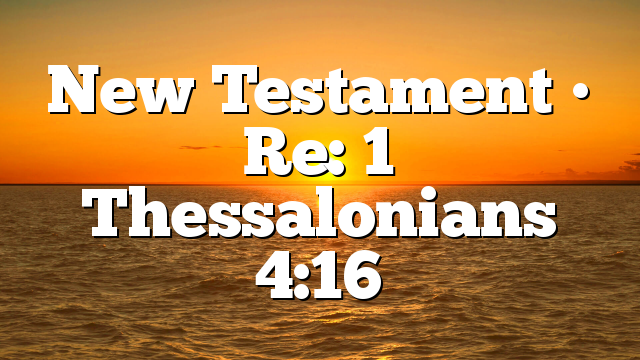1 Thessalonians 4:16
1Th. 4:15 Τοῦτο γὰρ ὑμῖν λέγομεν ἐν λόγῳ κυρίου, ὅτι ἡμεῖς οἱ ζῶντες οἱ περιλειπόμενοι εἰς τὴν παρουσίαν τοῦ κυρίου οὐ μὴ φθάσωμεν τοὺς κοιμηθέντας· 16 ὅτι αὐτὸς ὁ κύριος ἐν κελεύσματι, ἐν φωνῇ ἀρχαγγέλου καὶ ἐν σάλπιγγι θεοῦ, καταβήσεται ἀπ᾿ οὐρανοῦ καὶ οἱ νεκροὶ ἐν Χριστῷ ἀναστήσονται πρῶτον, 17 ἔπειτα ἡμεῖς οἱ ζῶντες οἱ περιλειπόμενοι ἅμα σὺν αὐτοῖς ἁρπαγησόμεθα ἐν νεφέλαις εἰς ἀπάντησιν τοῦ κυρίου εἰς ἀέρα· καὶ οὕτως πάντοτε σὺν κυρίῳ ἐσόμεθα.
Spent some time looking over the exegetical history from John Calvin to J. Weima[1].
He employs the term κελεύσματος, (shout,) and afterwards adds, the voice of the archangel, by way of exposition, intimating what is to be the nature of that arousing shout—that the archangel will discharge the office of a herald to summon the living and the dead to the tribunal of Christ.
John Calvin
Paul is invoking an eschatological – apocalyptic scenario where 98% of the scenario is left to be filled in by the reader. Not sure what can be assumed about the Thessalonian’s familiarity with Second Temple Apocalyptic literature but that isn’t the problem. Paul invokes the scenario as if they were familiar with it. In the apocalyptic literature divine commands are often delivered by a subordinate agent, for example the opening of the seals in the Apocalypse where The Lamb opens the seals but a command is given by one of the living beings:
Rev. 6:1 Καὶ εἶδον ὅτε ἤνοιξεν τὸ ἀρνίον μίαν ἐκ τῶν ἑπτὰ σφραγίδων, καὶ ἤκουσα ἑνὸς ἐκ τῶν τεσσάρων ζῴων λέγοντος ὡς φωνὴ βροντῆς· ἔρχου.
J. Weima[1] disagrees, he thinks that αὐτὸς ὁ κύριος nails down ὁ κύριος as the agent of κελεύσματι. I don’t follow that. ἐν κελεύσματι is an attendant circumstance. The pronoun αὐτὸς ὁ κύριος draws attention to identity of the agent in the main verb καταβήσεται ἀπ᾿ οὐρανοῦ.
Ran across a somewhat tangential observation about the constituent order in this passage. αὐτὸς ὁ κύριος is a point of departure followed by a long marked focal constituent ἐν κελεύσματι, ἐν φωνῇ ἀρχαγγέλου καὶ ἐν σάλπιγγι θεοῦ in the pre-verbal slot[2]. This doesn’t particularly address the question at hand but I thought someone might like to read this paper.
[1] a Google search: φωνῇ ἀρχαγγέλου who is speaking, delivered among others J. Weima 2014,
1-2 Thessalonians (Baker Exegetical Commentary on the New Testament)
By Jeffrey A. D. Weima, 2014
[2] See page 25, Greek Word Order in 1 Thessalonians 4:13–5:11 Stephen Wunrow April 16, 2013
https://www.academia.edu/25302324/Greek … _4_13_5_11
Statistics: Posted by Stirling Bartholomew — January 20th, 2017, 4:06 pm



